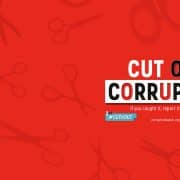|
Getting your Trinity Audio player ready...
|
With Youth Month just past, it’s important to remember that the problems faced by our young people happen every day, all year round. For instance, taking a driver’s test can be a daunting experience for any young person. It’s an act that affirms wishes for a bright future and independence – that feeling that comes with being your own person.
Failure is almost unimaginable – having a driver’s license translates into success at personal development goals. So, when one is faced with the adversity and stress of a corrupt testing official on that crucial day, the results can be devastating.
Such was the experience of an anonymous complainant who reported his experience with a crooked official during his license test in the Free State to Corruption Watch. Although the test had gone on without glitches, the reporter was failed – as he claims – because he refused to bribe the official. He reckons the total abuse of power by the official was a sign of common practice. “I had not made any mistakes and followed all the road rules and signs,” said the reporter. “On our way back to the centre, the testing officer – a lady – asked how much I had with me or how much I was prepared to get this ‘thing’ (she was referring to the license).”
Surprised, he responded by saying he was not prepared to pay anything except the legitimate administration fee for the issuing of the license, the testing officer failed him. “When we reached the testing centre, she told me to wait outside while she filled in the testing sheet/form. After a while she called me in where she then said I had failed my test because I stepped[sic] on a stop line (mind you, she did not point this out at the exact moment I did it on the road, nor was I aware of it) she then said I had failed my test and should book another appointment.”
This is precisely the area of work that Corruption Watch should engage young people on – awareness of the challenges of corruption where it affects them the most – according to Sithembile Mbete, the organisation’s latest and, at 32, youngest addition to its board of directors.
A culture of intolerance among young people is important, she says.
“The thing about it is that we are making it ok for how things are always going to be in South Africa, because it means that this is the way of doing things… we have to encourage good deeds in those positions of power, because the current is a big problem.”
Good governance is crucial for development
Mbete joined the board of Corruption Watch in March this year, a move that she had seen coming for a while, as she’d always been attracted to the area of good governance. “What attracted me to the good governance space and doing this kind of work is the concept of government and how the country is administered, and whether that is done in ways that are productive and ethical and are actually for the greater good.”
She had previously worked in the Presidency as part of the secretariat of the National Planning Commission, which means she contributed to the development of the National Development Plan. Her work also involved participating in the anti-corruption policy of the country.
“To me good governance is fundamental to whether the country keeps going or not, whether or not people have got opportunities and are able to really improve their lives.” The reason why it is imperative for young people to get involved in fighting corruption, she says, is that they have the ultimate power to change behaviour for the betterment of our society.
The people who are really going to bear the brunt of all of these decisions, she adds, and feel the effects of corruption, are young people. “That’s why Corruption Watch’s work is so important – because yes, what gets the publicity and what gets the headlines is the big court cases and the litigation about all sorts of things, but I think Corruption Watch’s everyday work on schools and school governing body corruption, and at the testing centres and the traffic department… that everyday kind of petty corruption, is very important to focus on because that is what affects people’s lives.”
For young people, it’s that kind of corruption that often makes the difference between success in life or not, she says.
Making a contribution
Mbete lectures in International Relations at the University of Pretoria. The subject of governance is one of the focus areas of her research studies.
“For me, being involved in this space is a natural way to contribute to a better life for everyone in South Africa…the effects of corruption or poor governance or bad administration aren’t often felt immediately, but they’re felt in the future…and that’s why it become important for young people to be concerned about corruption, because often the people that are making the decisions or are doing the bad things or the negative things aren’t the ones who are going to feel the effects of those decisions later.”
Mbete says if young people looking for jobs cannot get a driver’s license without paying or bribing the testing officer, heir future is completely undermined because they then need to engage in corruption in order to progress in life.
“And if you don’t have the money for example to bribe a testing officer or the money that you’ve got is to just get that test and to do your driving lessons, then you realise that it is just unfair and unjust.”
Youth have the power to change the situation
“A democratic South Africa is supposed to provide equal opportunities for everybody and, actually, more opportunities for young black people who were disadvantaged under the previous regime, and that’s what the Constitution says, that it’s not just equal opportunities.”
The Constitution talks about redress. It talks about having a system that aspires towards creating opportunity and good livelihoods for black people, in particular young black people. Corruption undermines that, she says.
For a perfect example of how young people’s strength can be realised, look no further than the recent UK elections, says Mbete. “This is such an important lesson for South Africa. In the Brexit referendum, it was very close between the people that voted to leave the EU and the people that voted to stay, but the turnout of the young people, like people below 30, I think, was really, really low.”
This was the case, says Mbete, despite all the pre-referendum surveys having indicated that a majority of young people were completely anti-Brexit and wanted to stay in the EU. “For them and for their future it makes sense. If you’re a young person in England you are better off being in the EU with the options for work and stuff than outside.
“And so, a lot of young people didn’t vote. And in that election we see what happened. With the latest election, the latest parliamentary election, young people turned out at higher rates than they have ever turned out before.”
The youth turnout in this latest election was high, she says, and the majority of young people that turned out voted for the Labour Party more than they voted for the Conservative Party. “To me that is such an example of the impact and the power that young people have got now.”
In England, she points out, there are more old people than there are young people. “In South Africa, where the median age is 24 or 25 and there are more people below the age of 35 than above, we have so much power in our numbers to make an impact in the country. So I think we need to sort of take that on board.”
Corruption, she says, is bad because it means there are stock shortages in clinics and you don’t get the medicine that you need because that medicine is being used elsewhere.
“People recognise the corruption they see every day, but of course they don’t feel empowered to do anything about it and to change things, we need to just be very practical about some things.”
The problems are not theoretical – they actively undermine our everyday lives and they keep resources from the things that make a difference in people’s lives. “One of the things that has been successful for Corruption Watch is being able to make these things make sense to people on a practical level and I think that is where you guys need to keep developing.”








